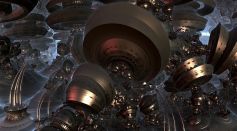PHYSICS & MATH
Yale Creates Error-Correcting Cat for Quantum Computers

A New Breakthrough Makes Use of "Fool's Gold"

Many Students With the Potential to Excel in STEM Fields Struggle in School

Quantum Negativity Could Improve Metrology Precision

New Quantum Computer Application in Materials Science
CERN Finds New Evidence of Ultrarare Process That Could Explain Dark Matter
Rare, "Ghostly" Sun Particles Detected in an Underground Experiment in Italy
Gravitons Create 'Noise' in Gravitational Wave Detectors, New Study Reveals

US Reveals Potentially Impenetrable Quantum Internet

Stingless Bees Create Spiral Beehives Similar to the Formation of Crystals

[COVID-19 Update] How Does the Weather Affect Covid-19 Droplets?
Penguins Can Shoot Their Poop Cannons with a Trajectory of Over Four Feet
A Walk to Remember: NASA Astronauts Conduct Spacewalk to Replace Lithium Ion Batteries as Part of Power Upgrades in ISS

Full STEM Ahead: Extend Your Kid’s Learning Beyond the Classroom
Most Popular

Largest Known Volcanic Aquifer Discovered Beneath Oregon's Cascades

New 'Supergiant' Sea Bug Found in South China Sea, Named After Darth Vader

Mediterranean Sea Was Refilled by a Catastrophic Flood Millions of Years Ago

Mysterious Cosmic Waves That Sound Like Birds Detected in Unexpected Space Region





